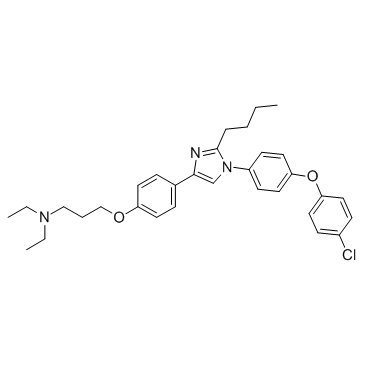
Azeliragon
CAS No. 603148-36-3
Azeliragon ( TTP-488 | PF-04494700 )
产品货号. M15253 CAS No. 603148-36-3
一种口服生物可利用的 RAGE 小分子抑制剂。
纯度: >98% (HPLC)
 COA
COA
 Datasheet
Datasheet
 HNMR
HNMR
 HPLC
HPLC
 MSDS
MSDS
 Handing Instructions
Handing Instructions
| 规格 | 价格/人民币 | 库存 | 数量 |
| 2MG | ¥267 | 有现货 |


|
| 5MG | ¥381 | 有现货 |


|
| 10MG | ¥648 | 有现货 |


|
| 25MG | ¥1199 | 有现货 |


|
| 50MG | ¥2130 | 有现货 |


|
| 100MG | ¥3459 | 有现货 |


|
| 200MG | 获取报价 | 有现货 |


|
| 500MG | 获取报价 | 有现货 |


|
| 1G | 获取报价 | 有现货 |


|
生物学信息
-
产品名称Azeliragon
-
注意事项本公司产品仅用于科研实验,不得用于人体或动物的临床与诊断
-
产品简述一种口服生物可利用的 RAGE 小分子抑制剂。
-
产品描述An orally bioavailable small molecule inhibitor of RAGE; inhibits sRAGE from binding to RAGE ligands, S100b, amphoterin and carboxymethyl-lysine; has been shown to inhibit the binding of sRAGE to Aβ1-42 in a fluorescent polarization assay; reduces accumulation in the spleen of Aβ peptides and the expression of IL-6 and macrophage colony stimulating factor, reduces both inflammatory markers (TNF-α, TGF-β and IL-1) and CNS amyloid deposition.Alzheimer's Disease Phase 3 Clinical(In Vitro):Azeliragon (4 nM; 16 hours; T cells) treatment inhibits of wild type mice (WT) but not the deletion of the receptor (RAGE-/- mice) T cells and significant reduction in the production of IFN-γ.(In Vivo):Azeliragon (100 mcg/d; intraperitoneal injection; every day) treatment reduces syngeneic islet graft and islet allograft in NOD and B6 mice (Islets were isolated from young prediabetic NOD/LtJ mice and transplanted into NOD mice with spontaneous diabetes; islets were isolated from WT BALB/c mice and transplanted into B6 mice with diabetes).
-
体外实验Azeliragon (4 nM; 16 hours; T cells) treatment inhibits of wild type mice (WT) but not the deletion of the receptor (RAGE-/- mice) T cells and significant reduction in the production of IFN-γ. Cell Viability Assay Cell Line:Purified T cells from RAGE-/- or WT B6 mice.Concentration:4 nM Incubation Time:16 hours Result:Inhibited of WT but not RAGE-/- T cells, and significantly reduced the level of IFN-γ.
-
体内实验Azeliragon (100 mcg/d; intraperitoneal injection; every day) treatment reduces syngeneic islet graft and islet allograft in NOD and B6 mice (Islets were isolated from young prediabetic NOD/LtJ mice and transplanted into NOD mice with spontaneous diabetes; islets were isolated from WT BALB/c mice and transplanted into B6 mice with diabetes). Animal Model:Prediabetic NOD/LtJ (6-7 week old) mice, NOD mice with spontaneous diabetes, WT BALB/c mice (8-10 week old) and B6 mice with diabetes .Dosage:100 mcg/d Administration:Intraperitoneal injection; every day Result:Prolonged islet auto and allograft survival.
-
同义词TTP-488 | PF-04494700
-
通路Others
-
靶点Other Targets
-
受体RAGE
-
研究领域Neurological Disease
-
适应症Alzheimer Disease
化学信息
-
CAS Number603148-36-3
-
分子量532.116
-
分子式C32H38ClN3O2
-
纯度>98% (HPLC)
-
溶解度10 mM in DMSO
-
SMILESCCCCC1=NC(=CN1C2=CC=C(C=C2)OC3=CC=C(C=C3)Cl)C4=CC=C(C=C4)OCCCN(CC)CC
-
化学全称1-Propanamine, 3-[4-[2-butyl-1-[4-(4-chlorophenoxy)phenyl]-1H-imidazol-4-yl]phenoxy]-N,N-diethyl-
运输与储存
-
储存条件(-20℃)
-
运输条件With Ice Pack
-
稳定性≥ 2 years
参考文献
1. Sabbagh MN, et al. Alzheimer Dis Assoc Disord. 2011 Jul-Sep;25(3):206-12.
2. Chen Y, et al. J Immunol. 2008 Sep 15;181(6):4272-8.
3. Burstein AH, et al. BMC Neurol. 2014 Jan 15;14:12.
产品手册




关联产品
-
SAR7334 hydrochlorid...
SAR7334 hydrochloride 是一种有效的 TRPC6 特异性抑制剂,能够抑制 TRPC6 电流,IC50 值为 7.9 nM。
-
Tyroserleutide hydro...
Tyroserleutide hydrochloride is a small molecule tripeptide isolated from the degradation product of pig spleen, which can inhibit tumor growth in vivo and in vitro.
-
11beta,13-Dihydrolac...
11,13-Dihydrolactucin is a useful organic compound for research related to life sciences.



 021-51111890
021-51111890 购物车()
购物车()
 sales@molnova.cn
sales@molnova.cn







